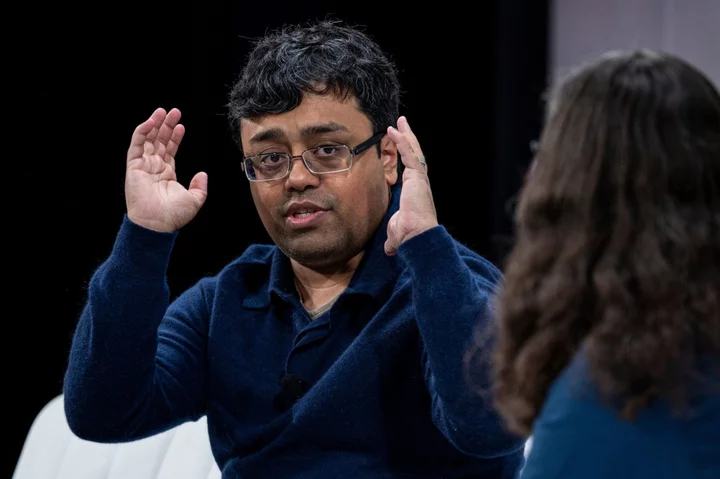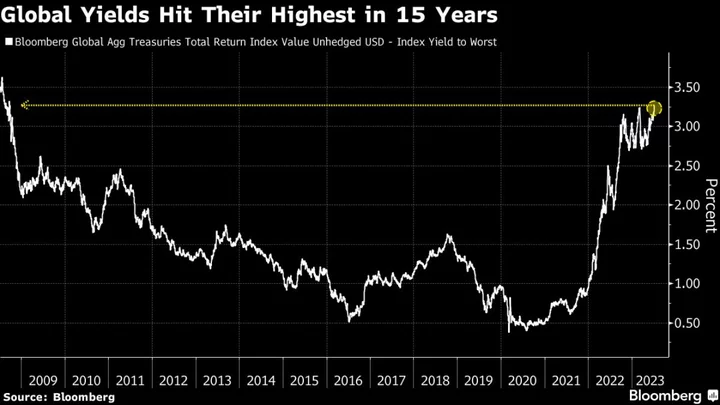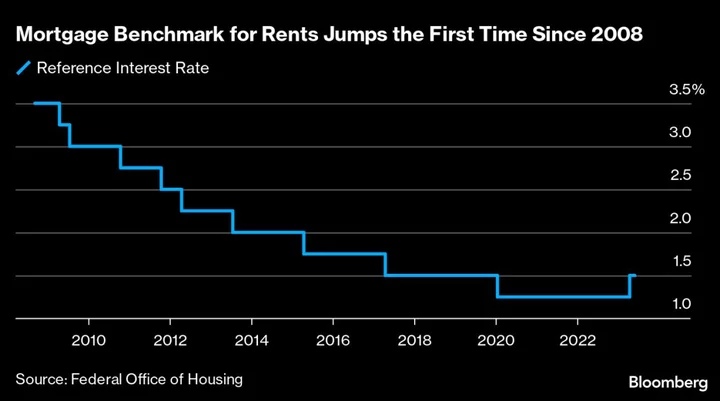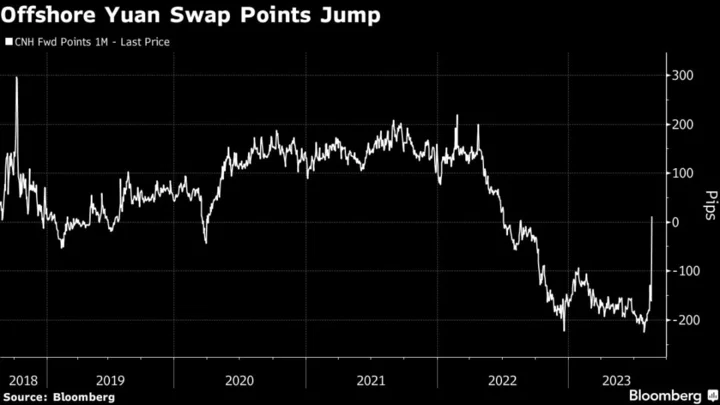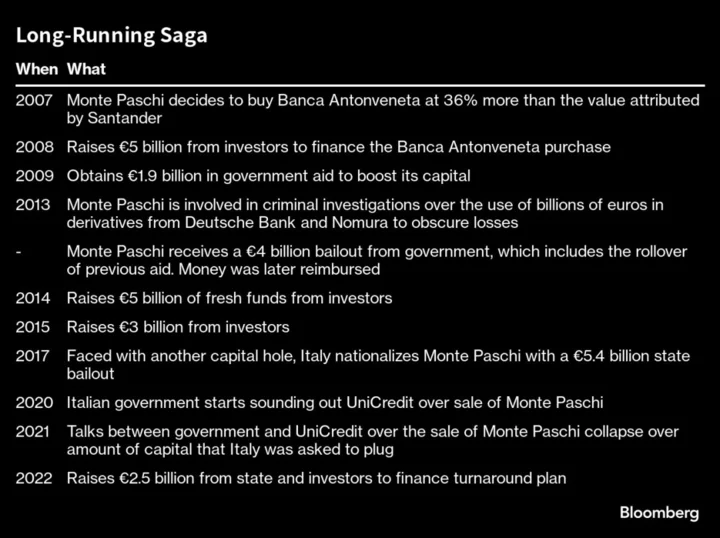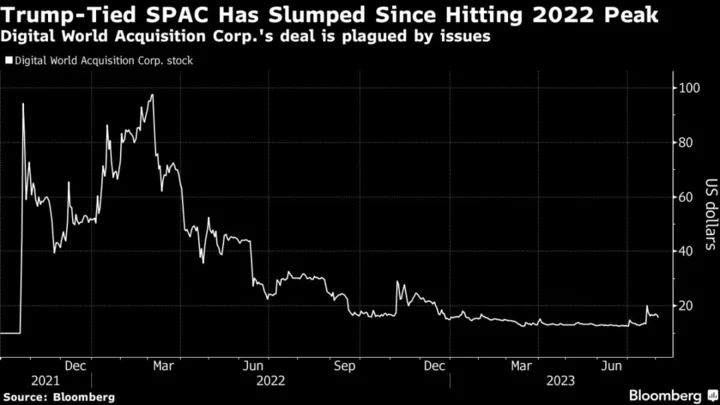Late last year, Stability AI Ltd., a startup based in London, was at the center of the AI hype cycle thanks to the massive success of Stable Diffusion, an artificial intelligence model that enables users to create uncanny and sometimes startlingly realistic images based on prompts of just a few words.
After raising more than $100 million, the company recruited a cadre of senior executives from larger technology firms as part of an ambitious plan to branch into new products and forge a viable business. Stability distinguished itself with its focus on open-source software, winning over experienced engineers and scientists from tech giants like Google, Amazon and Adobe, who saw making code public a better alternative to the closed AI models under development elsewhere. But with many other AI companies rushing their own models to market, Stability had to be fast.
Believing generative AI could be as consequential as the dawn of the internet, companies raced to develop this tech. During such periods of wild communal exuberance, Silicon Valley breeds not only successes but also CEO storytellers and hyperbolic claims. At first, Stability appeared to be on track to the top: The previously unknown company burst onto the startup scene in the fall as Stable Diffusion rapidly became one of the most popular image generators on the planet. In subsequent months, the company rolled out a slew of AI models and tools. Its leader, Chief Executive Officer Emad Mostaque, projected charisma and excitement.
“Look, we came out of nowhere, we did a few things, and I think we flipped the world of artificial intelligence,” Mostaque told a crowd at a splashy launch party in San Francisco in October, just after welcoming revelers with a giant projected image of himself astride a winged unicorn.
Since March, however, optimism surrounding Stability has died down. At least six of its senior hires are gone, including the chief operating officer and head of research. As competing AI startups raked in financing, Stability was unable to raise new funding at a desired $4 billion valuation. (The company denies that it had difficulty raising money.) At least one prominent generative AI business has accused Stability of not paying a $70,000 bill in time or in full. And in July, one of the company’s co-founders filed a lawsuit alleging he was tricked into selling his stake in the startup for $100. (Stability has said the lawsuit is without merit.)
Asked about the turnover and executive departures, the company’s bespectacled 40-year-old co-founder responded in a statement that this is par for the course at any startup. “Of course there’s churn,” Mostaque said, adding that this can happen especially when there may not be a “cultural fit” between employees and a company.
But interviews with nearly two dozen current and former employees, investors, vendors and contractors describe a disorganized company helmed by an inexperienced CEO with a history of outlandish claims and lofty promises that don’t always come to fruition. According to these interviews, this helped drive away some of the very executives and engineers that Mostaque was relying on to push Stability forward during a critical period of growth.
Stability says it has not had trouble fundraising. It’s not trying to raise more money at all, a spokesperson said. The company also pushed back on the idea of internal turmoil, noting that it’s been releasing new features, making key hires and is planning to grow its headcount beyond the 185 employees it had as of earlier this summer. Peter O’Donoghue, Stability’s chief financial officer and a board member, said it has reached an agreement with the generative AI company that complained it hadn’t been paid.
The company also denied claims made in a June article in Forbes that its founder strays from the truth. On stage at a Bloomberg conference in June, Mostaque said that he sometimes is misunderstood. “I’m doing the best I can,” he told the audience. “I have a very definitive view of the future.”
Under Pressure
Like many founders, Mostaque often talks about his company in utopian terms. Still, some of his statements defy belief, say people who have worked with Stability. Multiple people interviewed by Bloomberg News said the CEO told them that he once worked as a secret agent for the UK government. (When Bloomberg News asked about this, Stability declined to respond and a spokesperson for the UK Foreign Office declined to comment.)
While it's common for startup founders to embellish in order to make their companies appear more impressive, Mostaque has presented blue-sky conversations about partnerships and projects as sure things long before any agreement has actually been reached. In an April interview with Bloomberg News in San Francisco, for instance, he said that his company would soon launch a deepfake detection contest with an award of up to $1 million, partly in tandem with the nonprofit Thorn, which fights child sexual abuse material online.
Several months later, Thorn CEO Julie Cordua told Bloomberg News she had spoken to Mostaque in the spring about a competition, but the companies never ended up collaborating. “I said, ‘that would be interesting,’ but we did not pursue it,” she said.
Mostaque has also claimed he has spoken to multiple prime minister offices about building AI models for nation states. “All the largest companies in the world are now coming in to support us and partner with us,” he said in a May interview at his office.
Yet when asked to name of some of its customers, Stability mentioned Tome — a startup in which Mostaque is an investor — as well as Amazon Web Services, which it pays for cloud services. (Amazon also offers Stable Diffusion via its Amazon Bedrock service.) AWS and Tome would not comment on the record. Stability also pointed to Jasper, an AI startup. Its CEO has publicly stated that Mostaque invested in the company, but a Stability spokesperson said Mostaque is not an investor. Jasper declined to comment.
In early June, Forbes published a scathing article citing interviews with 13 current and former employees and more than two dozen investors, former colleagues and collaborators, which accused Mostaque of embellishing parts of his past and stated that his company was losing far more than the $10 million in annualized revenue he said it was bringing in. (Mostaque and Stability disputed the report; in a blog post, Mostaque addressed many of the story’s points but did not mention the company’s revenue.) In a recent statement to Bloomberg, Mostaque said that Stability’s projected annual revenue was more than $10 million as of October, but that this number has fallen as the company has focused increasingly on research and development.
Peter Diamandis, an entrepreneur and investor in Stability, acknowledged that the recent scrutiny has created problems for the company. “It is difficult to raise money when you’ve got articles like Forbes coming out,” he said of the situation in general. He also characterized the internal turmoil as normal. “This is a startup that’s in its period of birth. It’s working to find the right team, the right management style,” he said. “It’s always a turbulent time.” In the spring, Stability sold a convertible note worth less than $25 million, according to people familiar with the deal. The company says that is inaccurate but wouldn’t provide the amount it had raised.
New York hedge fund Coatue Management and Silicon Valley firm Lightspeed Ventures, two of Stability’s main investors, declined to comment. Jim O’Shaughnessy, a Stability investor who serves as board chair, didn’t respond to multiple requests for comment.
Mostaque has come under criticism from investors for his entrepreneurial ventures before. In 2019, the former hedge fund employee and software consultant took the lead of Symmitree, a blockchain-based mobile banking service for refugees. When that fizzled out, several investors raised concerns about the company, according to messages viewed by Bloomberg News and conversations with multiple shareholders who asked not to be identified when discussing private matters.
In a statement from his lawyer, Mostaque said Symmitree was a young company aimed at helping at-risk populations, and that he “saw potential in the business, but ultimately was unable to scale it to the extent planned.” Mostaque added that any messages Bloomberg reviewed were likely “sent by a disgruntled investor” before the shareholders received a majority of their funds back.
Three different Symmitree investors said Mostaque’s current Stability investors never contacted them for due diligence. Stability’s largest investors declined to comment, and Diamandis said he did not reach out to prior investors but felt confident about Mostaque’s leadership.
Christian Cantrell, who spent about five months as Stability’s vice president after two decades at Adobe and a stint working on his own startup, defended the CEO’s unconventional style. “I know there’s a lot of controversy and a lot of people wondering about him,” Cantrell said in a May interview. “I’ll just say he’s incredibly intelligent and surprisingly warm.”
Several weeks ago, Cyrus Hodes, a Stability co-founder, filed suit against Mostaque for allegedly violating his fiduciary duty. Hodes claimed that his former business partner effectively gave up on Stability’s initial goal of building a pandemic-related data service, which it began working on in the early days of Covid-19. Hodes alleged Mostaque stopped communicating with him and began “secretly diverting” his time and company resources to what would become Stable Diffusion, the hit image generator. Hodes sold his 15% stake for $100 — in two transactions in October 2021 and May 2022 — alleging in the suit that Mostaque led him to believe their company was “essentially worthless.” Stability replied that the suit was “without merit.”
Stability is also warding off lawsuits from Getty Images and artists who claim that Stable Diffusion illegally ripped off their work. The company, which filed a motion to dismiss the claims, declined to comment on ongoing litigation.
There have also been questions about whether Mostaque tried to take credit for developing the technology underlying Stable Diffusion.
The first version of what would later become Stable Diffusion was created by researchers in Germany who, along with a research scientist from an AI startup called Runway, built an open-source AI model that could automatically generate computer images from brief text prompts. In mid-2022, Mostaque reached out to the group, offering to cover computing costs to improve that model. While it’s common for businesses to grow on top of open-source tech, when Stability touted the resulting work in late August — the public version of Stable Diffusion — and again in October, it didn’t acknowledge the researchers, despite having done so in the past.
In an October press release announcing its $101 million venture funding round, Stability declared itself “the company behind Stable Diffusion, a powerful, free and open-source text-to-image generator.”
That didn’t sit well with Björn Ommer, a professor at Ludwig Maximilian University of Munich, whose lab led the development of the algorithm underpinning Stable Diffusion. “In science, you are supposed to credit somebody, to cite somebody, if you take something from somewhere,” he said.
Stability has pointed out that it developed subsequent versions of Stable Diffusion in house, and that the company hired three of the researchers behind the original work. Following the criticism, the company has been clearer about the origins of the initial model.
“Order to Chaos”
Stability now faces the challenge of transforming enthusiasm for generative AI into a path to profitability. This is an issue that nearly all startups confront, and departed Stability staffers described continual difficulty settling on a business model and approach.
David Ha, a former Google researcher who resigned last month from Stability after an eight-month stint as its head of research, said that Mostaque’s relentless pursuit of ideas that others did not always understand made it difficult to figure out what exactly the company was aiming for or how it planned to achieve it. Another employee, a former contractor who worked for Stability in late 2022 and early 2023, described the company culture as siloed and secretive, with a confusing corporate structure and little communication about what work — if any — needed to be done. Stability declined to comment on this characterization.
Speaking to Bloomberg News about Stability’s revenue strategy in May, Mostaque suggested that heavily regulated industries such as finance and health care would line up to pay for customized AI models using their own proprietary data over the closed versions being developed by competitors. “Imagine if there was an open, auditable model with fully licensed data,” he said. “That’s what we’re building.”
As Stability has worked to find its footing, rivals have gained ground. In July, Facebook parent Meta released its latest large language model, Llama 2, for commercial use. While Meta’s tool is more restricted than most open-source software, the product will directly compete with Stability. Ha wrote in a statement to Bloomberg News that despite helping create the field, Stability “will need to find its own ‘moat’ to be competitive.”
Mostaque acknowledges that Stability has struggled to professionalize. In his May interview with Bloomberg News, he said that until the previous summer, the startup was “a pre-seed company with heavy family influence” reliant on his personal loans. “Then we grew up,” he added.
By the end of June, Daniel Jeffries, Stability’s chief information officer, Scott Draves, the company’s VP of engineering, David Ha, the research head, and Ren Ito, Stability’s Chief Operating Officer, were also gone. In mid July, Louis Castricato, who worked on Stability’s large language model efforts and was the co-leader of CarperAI — a research lab funded and operated by Stability — announced he was leaving both to work at EleutherAI, a nonprofit, independent research lab that has received funding from Stability (the company also serves on EleutherAI’s board of directors). In late July, more than a half dozen other employees left Stability; a company spokesperson said that group was let go.
“Startup environments do not suit everyone,” O’Donoghue, Stability’s CFO, said in a July interview. “We have brought in some amazing talent, and I can tell you they have to work really, really hard,” he added. “They’re trying to bring order to chaos.”
Yet from the outside, the startup can still appear chaotic. One business partner who worked with Stability on a monthslong project described the company as sloppy and disorganized — and reluctant to pay.
Last year, Stability had hired the startup, a prominent AI company based in California, to help manage the underlying data for a large language model. When it came time for Stability to pay its bill, about $70,000, the company dragged its feet and cancelled four meetings related to the payment, according to the CEO of the startup it hired, who asked not to be named so as to avoid being associated with Stability. At one point, a Stability employee forwarded an email chain in which its management discussed negotiating a much smaller payment or getting out of the contract altogether, according to another person familiar with the situation who asked to remain anonymous discussing private information.
Stability’s StableLM large language model launched in April; it wasn’t trained on the startup’s infrastructure, the person familiar with the situation said. In July, the companies negotiated the payment down to $40,000, which Stability paid. O’Donoghue blamed the delay on the “ordinary course of business” in which parties disagreed on the “value that was created.”
“Both parties are happy and we’ve moved on,” O’Donoghue said.
In recent weeks, Mostaque and his company have taken to social media to highlight what Stability has accomplished over the past year. It has rolled out multiple versions of Stable Diffusion, large language models, and the image creation and editing tool DreamStudio, among other products.
Mostaque, for his part, has no plans to slow down. In May, he said he wants to take Stability public once “the time is right.”
“So, fingers crossed, sooner rather than later,” he said. “Because I think it should be a public company for scrutiny.”
--With assistance from Hannah Miller.

